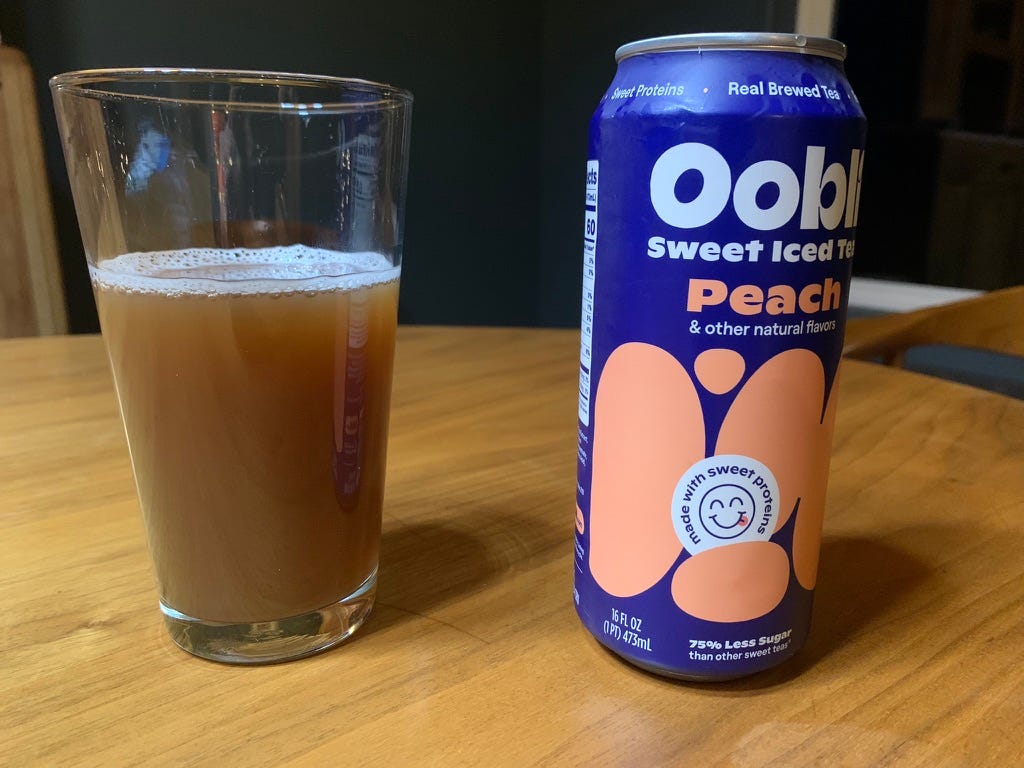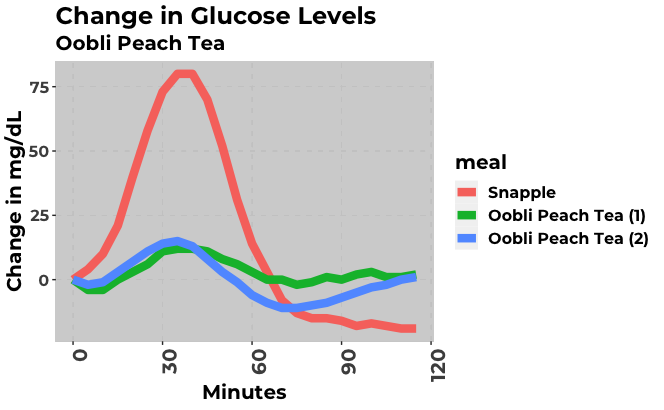Personal Science Week - 231002 Oobli
Testing a new, low-sugar drink
Personal scientists don’t believe something just because a professional says it’s true. We like to see for ourselves.
This week we test a new protein-based sweetener that claims to keep glucose levels intact without sacrificing flavor.
Oobli is a food tech company founded by a UC-Berkeley chemical engineering expert who specializes in bioprocess engineering to mass produce a new kind of sweet-tasting protein. Most sweet compounds are made of sugar molecules or their look-alikes: fructose and sucrose of course, but also aspartame, saccharin, and many others. They trigger special receptors on your tongue that tell the brain that you just tasted something sweet. But sugar is more than just a taste. It’s a food that your body converts into energy or — when you have too much — gets stored as fat for later use. Other chemicals that taste sweet might not get converted to fat, but they’re still doing something, and nobody knows the long-term effects if you ingest too much of them.
But protein is protein. It’s a very normal molecule that your body knows how to digest. Most of your body tissue, in fact, is made of protein.
So far, scientists have discovered seven different sweet or taste-modifying proteins: Brazzein, Thaumatin, Monellin, Curculin, Mabinlin, Miraculin and Pentadin. Some, like miraculin, derived from a West African berry, don’t actually taste sweet. Instead, they work on taste receptors normally used for other flavors, like sour, blocking them in a way that enhances other, sweeter sensations. The overall effect is that a tiny bit of sweet flavor feels way sweeter than normal. Oobli uses sweet proteins to manufacture very low-sugar drinks (and chocolate!) that taste sweet-ish without the sugar molecules that raise your blood glucose levels.
How well does it work?
Personal scientists don’t just take somebody’s word for it. The company claims it tastes great without affecting my glucose levels like a sugar-based alternative. The only way to know for sure is to slap on a CGM and try it myself.
Last weekend, first thing after waking I drank an ordinary one-serving size bottle of Snapple Peach Tea. On the following two mornings after that, I tried the Oobli tea. Then I compared the numbers.
Sure enough, my glucose levels after drinking Snapple are way higher than when drinking Oobli.
Based on my testing, I can confirm that it works for me.
How does it taste?
I’m not a huge ice tea drinker, partly because I find most of the commercial ones (like Snapple) too sweet. By contrast, to me Oobli isn’t overly sweet at all — in fact, I’ll give it credit for being exactly the right amount. But the flavor is … well … oddly different. Not in a negative way, but just … different.
If you like sweet ice tea drinks, but you don’t want all that sugar, I’m pretty sure you’ll find Oobli a worthy alternative. In fact, even if you don’t particularly like iced tea but you want something flavorful, the Oobli flavors I tried were quite good.
Try it yourself from Amazon ($17) or a growing number of retail stores. The Oobli web site offers to send you a free six-pack if you pay $6 shipping.
Incidentally it goes without saying that we have nothing to do with the company, nor do we get kickbacks or anything. I received my drinks free for participating in a trial with Tastermonial (They’re always recruiting!).
Vivoo responds
When we reviewed the new at-home urine test from Vivoo last week, we said we had reached out to the company’s scientists to ask about why the same-day results at 9am were so different at 9pm. They responded, but the answer wasn’t very helpful and I couldn’t get them to offer additional scientific details beyond what I found from my own googling. Essentially, they admitted that results will fluctuate throughout the day, which is why you should test weekly under identical conditions.
Of course every scientist knows that tests should be conducted under similar conditions, but that begs the question of why you should care about the results. If a biometric changes throughout the day, then how do you separate the normal variability from whatever the underlying physical attributes you might want to optimize? In this case, I just don’t see why I would want to do more testing.
About Personal Science
Nullius in verba is the motto of the Royal Society, established in 1660.
The Royal Society’s motto ‘Nullius in verba’ is taken to mean ‘take nobody’s word for it’. It is an expression of the determination of Fellows to withstand the domination of authority and to verify all statements by an appeal to facts determined by experiment.
To learn more about Personal Science, please browse our web page, search through our extensive library of content, or contact us directly. Also, you are invited to join the Self Research Chats, sponsored by Open Humans each Thursday at 10am PST. There are always helpful and knowledgable people in those chats and they welcome newcomers.




IMO, the bigger problem with Vivoo (and similar services like Urinify) is that they interpret the data for you —they don’t show you the raw data. The test strips from Walmart you mentioned in a previous post at least have quantitative units (usually mmol/L).
It’s the difference between learning you have high blood sugar after drinking a Snapple, versus learning that your blood sugar goes up by 30…
Science is quantitative.